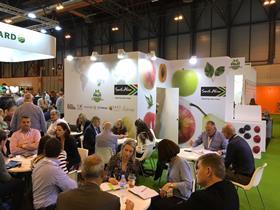
Fruit Attraction, which is being held in Madrid this week, is seeing plenty of South Africans among its visitors.
Not only is Fruit South Africa, the umbrella body of the South African fruit industries, participating officially for the first time, but many exporters have indicated that they will be present.
It is not surprising that there is such a keen South African interest. Fruit Attraction is scheduled at the start of the new South African fruit season and, for exporters of stonefruit and table grapes, it is ideal to meet with customers to make their final plans.
For citrus exporters and topfruit suppliers it offers the opportunity to wind up the 2018 season.
On the sidelines it is certain that the on-going debate about phytosanitary agreements with the EU regarding citrus will also be discussed.
The relationship between South Africa and the Mediterranean citrus producing countries can at best be described as difficult. The corridors of Fruit Attraction will offer the opportunity to rub shoulders and get a better understanding of each other.
This year’s event will also have special significance because of the developments surrounding Britain's impending exit from the European Union.
South Africans have been used to dealing with the EU, including Britain, since the mid-1970s and it is generally accepted that the British exit will alter the way of doing business considerably.
Historical documents reveal that Britain’s original entry into the EU was traumatic for those South Africans, with trade deals with the UK flying out of the window and being replaced by a period of increased entry duties.
This time round the South Africans will hope for a less dramatic event and will want to remove some uncertainties during their meetings in Madrid.
Over the years South Africans have become used to free movement of fruit and vegetables across the English Channel. Although it is not expected that there will be immediate changes for the country's produce, as South Africa gets used to the post-Brexit period, any delays in movement across the channel could be very disruptive.
It is well-known that South African fruit arriving on the continent, or in British ports, is transhipped in cases where programmes have to be met and where circumstances dictate that.
So far the South African fruit sector has left matters mainly in the hands of its government and its bilateral arrangements with the EU and Britain. This was confirmed again this week by the CGA’s Justin Chadwick.
“There is no change to our view on Brexit – hopefully it may result in better phytosanitary requirements to the UK. I am sure the commercial exporters will be in discussions with their receivers to plan for different scenarios,” he said.






No comments yet